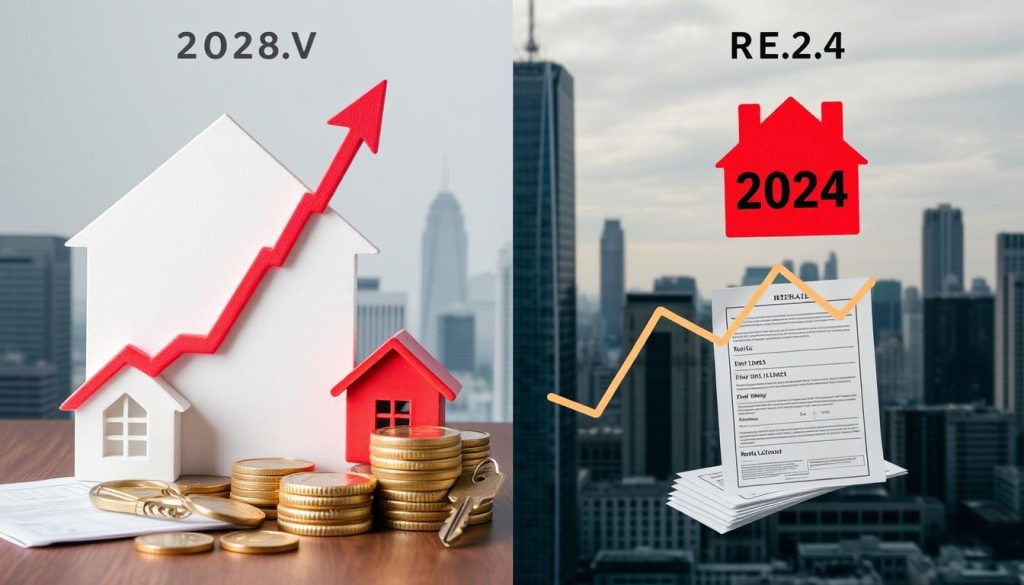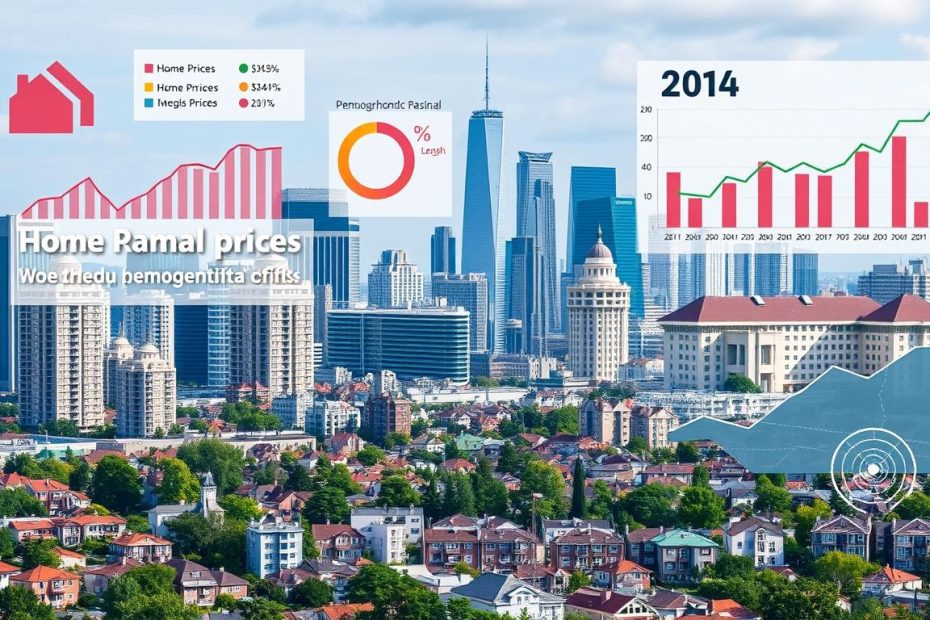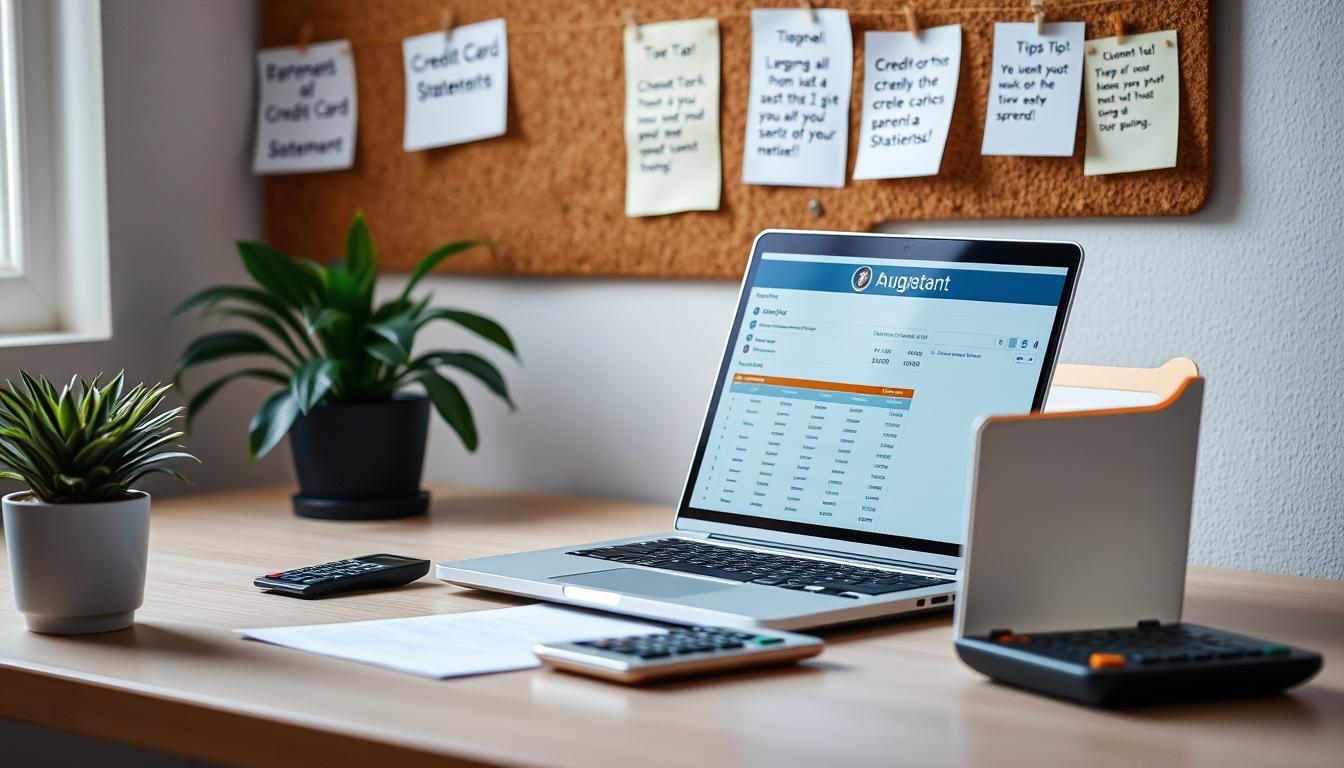As 2024 unfolds, Americans face a big choice: buying vs. renting a home in 2024. With mortgage rates now between 6 to 7 percent, the decision is harder than ever. Rent prices might drop as more apartments are built, easing the cost in cities.
Yet, student loans are back, making millennials think hard about buying a house. They wonder if buying now will affect their money freedom later.
Renting seems cheaper when you think about inflation. But owning a home offers stability and a chance to invest. However, high house prices make it tough for first-time buyers.
If you have student loans, looking at programs like the Saving on a Valuable Education initiative might help. It shows how renting for a bit could be a smart step towards owning a home.
When you compare owning to renting, the differences stand out. Renting might be easier on your wallet at first and less hassle. But rents can go up suddenly.
Buyers face big initial costs, interest on loans, and keeping up the home. In 2024’s changing market, your personal situation and what you know about the market will guide your choice. Should you buy a home or keep renting? It’s a big decision.
An Overview of the Housing Market in 2024
The housing market in 2024 has its ups and downs for those looking to buy or invest. Experts are spotting trends that affect whether people buy homes or rent them.
Current Home Prices and Predictions
The price of homes is still going up, but how fast varies by place. For example, Arizona’s home prices went up to $444,100, a 6.7% rise from last year. This can make buying your first home tough because of the high costs.
However, there’s good news with lower mortgage rates, now at 6.2%. This helps buyers afford more.
Rent Price Trends and Forecasts
Meanwhile, renting is getting better for some. With more apartments available, some cities, especially in the Sun Belt, might see lower rents. This is thanks to new buildings with great features. It’s good news for renters and changes how people invest in property.
Real Estate Market Analysis
An in-depth look at real estate shows that big factors like inflation really shape the market. In places like Arizona, even things like water scarcity affect what gets built. This shows how environment and city growth are linked.
Also, a big legal settlement with the National Association of Realtors is pushing for clearer rules. This could make the housing market steadier for everyone.
Economic Factors Influencing the Rent vs. Buy Decision
Two important factors affect the economic impact on home buying. First, we have the growing issue of student loans. Second, there’s the matter of job security and market stability. These factors greatly influence whether people choose to rent or buy homes in 2024.

The Impact of Student Loans on Housing Decisions
The pandemic pause on student loan payments gave many a short break. Yet, with over 43 million borrowers facing loan payments again, stress is high. This pressure makes renting seem safer financially. It skirts the hidden costs of owning a home, like maintenance and property taxes. This makes managing budgets easier for many.
Job Security and Market Stability
Job security and market health greatly sway the rent vs. buy choice. With some job markets struggling and others thriving, buyers are very careful. They fear losing jobs or earning less, which makes buying a home risky. Therefore, people often choose to rent in an uncertain economy.
Buying vs. Renting a Home in 2024: Pros and Cons
In 2024, people will have to choose between buying or renting a home. This choice affects your money and how you live. Both options have good points and things to think about for your future.
What Owning a Home Offers
Owning a house is a big achievement. It comes with perks like growing your money and getting tax breaks. You can cut your taxes through mortgage interest and property tax deductions. Owning a home helps you build wealth over time. Yet, you must be ready for extra costs. These include property taxes, insurance, and upkeep, taking up about 25% of your income.
Understanding the Advantages of Renting
On the other hand, renting has its advantages too. You pay less upfront, avoid fixing things, and can move easily. This is great for those who often relocate for jobs or personal reasons. Renting can be cheaper right away, especially in expensive areas. But the downside? Your rent can go up each year, and you miss out on homeowner benefits. You don’t get to build equity or enjoy tax breaks, affecting your money in the long run.
Hidden Costs of Buying and Maintenance Considerations
Thinking of buying? Remember the visible and hidden fees. You’ll need a down payment, between 5% and 20% of the house’s price. Plus, be ready for sudden repairs and maybe management fees. Though your home’s value may grow, fixing and maintaining it can stretch your budget.
In the end, choosing between buying and renting in 2024 depends on your finances, job plans, and how you want to live. Both have pros and cons. It’s vital to weigh your options and talk to financial experts. This way, you can pick the best path in today’s housing market.
Calculating the Costs: Financial Planning for Homebuyers and Renters
Making the choice between buying a home or renting can greatly affect your money matters. It’s vital to understand financial planning for homebuyers and how to weigh comparing rental costs. This knowledge helps in making choices that are good for your finances and are in tune with market trends.
Upfront and Long-term Expenses in Home Buying
For those looking to buy, the cost isn’t just the down payment. It’s best to put down 20% to skip private mortgage insurance. Then, there are closing costs, inspection fees, and property insurance. Together, they make up a big initial expense. This is just the start because there are also regular costs. Think property taxes, HOA fees, utilities, and upkeep, which could be about 0.5% of your home’s value each year.
Also, if you plan to move within three years, buying might not make financial sense. This is due to the high upfront costs you’ll face.
Comparing Rental Costs and Savings Opportunities
Renting brings a different set of financial considerations. This includes application fees, security deposits, and the first month’s rent upfront. While the monthly cost might be higher short-term—with average rent at $1,979 versus a $2,703 mortgage—there’s less upfront money needed.
Renters enjoy more flexibility and predictable monthly costs without worrying about surprise repairs. This option suits those who move a lot or live where renting is financially smarter.
Choosing to buy or rent depends on good financial planning. Check how your income lines up with any possible debts. Costs shouldn’t be more than 36% of your pretax income. Consider the chance of having to move, the risk of your home’s value dropping, and rental market shifts. Planning for these can secure your future financially.
Personal Lifestyle Choices: Renting vs. Owning a Property
Choosing between renting vs. buying affects your life and goals. It shows what you value, like stability or flexibility.
Flexibility and Commitment Considerations
Renting gives flexibility, key for those loving travel or needing to move for work. This adaptability is great in today’s changing world. But, owning a home means a big commitment. You have a mortgage and must upkeep the house. Yet, this brings a strong sense of home and belonging.
Lifestyle and Convenience Factors
How you live day-to-day changes with lifestyle and convenience factors in the rent versus buy debate. Renters often live near busy city centers, enjoying amenities with no upkeep worries. Homeowners, though, get to make their place unique. They can change colors or fix up the yard. This option offers more room, which is great for growing families.
Living situations have unique pros and cons. They deeply affect your way of life. It could be the simplicity of apartment living or the pride of owning a home. These choices mirror your personal goals and taste.
In the end, choosing to rent or buy matters beyond just money. It’s about matching your home with your life’s path. Think about how your choice shapes your everyday life and future plans.
Conclusion
The real estate market in 2024 shows buying a home or renting isn’t simple. People need to think about how buying a home affects them. This includes extra costs like upkeep and taxes. These can make owning a home feel harder than renting.
Renting costs are now often higher than mortgage payments in big cities. So, planning your finances is key if you’re thinking about buying a home. Deciding whether to buy or rent depends on many things. This includes how much money you have, what you want in the future, and if you’re ready to pay for upkeep.
In the end, it comes down to what you want and your money situation. Think about what you want in the future too. Knowing about the market and planning your money well is very important. This helps to choose the best option in the housing market of 2024.


